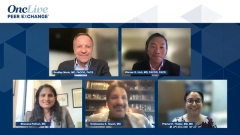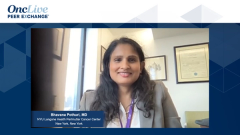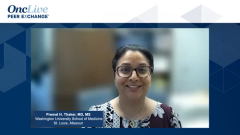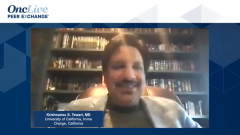
Cervical Cancer Management: Looking Toward the Future of Care
Closing out their discussion on the management of cervical cancer, panelists share their excitement for future evolutions in care.
Episodes in this series

Transcript:
Bradley Monk, MD, FACOG, FACS: This has been a robust discussion. We’re lucky that all of you are working hard to enroll patients on clinical trials, bring new medicines to the clinic, and evolve the landscape in cervical cancer. I’d like each of you to summarize what you’re excited about in the therapeutic landscape for cervical cancer. This will give you a chance to introduce something we haven’t discussed. Premal, I’ll have you go first.
Premal H. Thaker, MD, MS: As we’ve talked about, there a lot of exciting new drugs. With immunotherapy, we’re just at the tip of the iceberg. As you mentioned, TIGITs [T-cell immunoreceptor with immunoglobulin and ITIM domains], CTLA-4s, combinations, moving them earlier, and understanding the subpopulations better. We’re beginning to understand biomarkers, so I’m excited that Krish has an R01 [research grant] and is trying to learn about them. We might then understand who should get what and when, as opposed to random CPS [combined positive score] scores that we know are not accurate for our patients.
Bradley Monk, MD, FACOG, FACS: Warner, other thoughts?
Warner K. Huh, MD, FACOG, FACS: I agree. We all need to take a step back and see how much the landscape has changed in such a short period of time. I was worried after Krish’s trial, I didn’t know where we go from there. In 2 years, I think the algorithm for how we treat patients with recurrent cervical cancer will be completely different. It’s the dawn of a new era, it’s incredibly exciting.
Bradley Monk, MD, FACOG, FACS: To your point though, tisotumab vedotin is a different mechanism of action. Everything that’s happening with checkpoint inhibitors is sort of irrelevant. We needed a new class of agents, and it did that.
Warner K. Huh, MD, FACOG, FACS: I just don’t think people will understand the magnitude of that until they start prescribing it.
Bradley Monk, MD, FACOG, FACS: Yes. Bhavana, closing thoughts?
Bhavana Pothuri, MD: It’s exciting to see this flurry of activity in cervical cancer. We have tripled the survival, which is heartwarming and incredible for our patients. This field is going to continue to evolve. I think there is a role for NGS [next-generation sequencing] tumor testing and identifying those patient populations who can benefit from other targeted therapies, like neratinib, tucatinib, and others. It’s a win to see IO [immuno-oncology] moving up, and I would like to see it moved up further based on the CALLA and the KEYNOTE studies. I’m fortunate to work in this arena, to participate in trials, and to contribute to these discoveries to help our patients.
Bradley Monk, MD, FACOG, FACS: I know you’re very passionate about it, and I’m so grateful to and for all of you. Krish, any closing words?
Krishnansu S. Tewari, MD: I loved being a part of this panel and listening to everybody, I learned a lot. I have 3 things that I’m excited about: to finally see immunotherapy fulfill the potential that we always suspected it had in this disease; to learn how to prescribe a completely new class of drug for our patients, the tisotumab; and for the 5 therapeutic HPV [human papillomavirus] vaccines that are all novel, different, and in phase 2 studies. There’s a novel gorilla adenovirus, a long synthetic peptide, and a ubiquitous cancer antigen telomerase-derived HPV vaccine.
Bradley Monk, MD, FACOG, FACS: I want to thank all of you for caring about patients every day, making sacrifices for your family, losing sleep on early rounds at the hospital, doing long cases, and doing everything that you do for patients. All of you are high-volume clinical trialists, so all of the innovation happens because of you. Without the clinical trialist, new medicines never come to the clinic. I want to thank you, Bhavana, Premal, Warner, and Krish, and I hope to see you again soon.
Transcript edited for clarity.










































